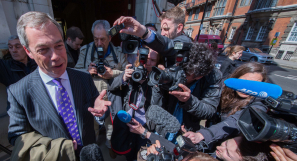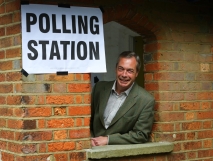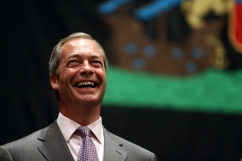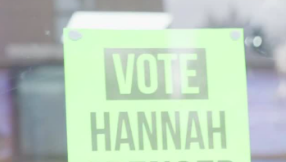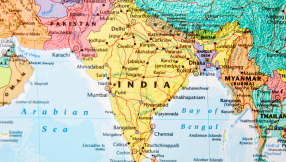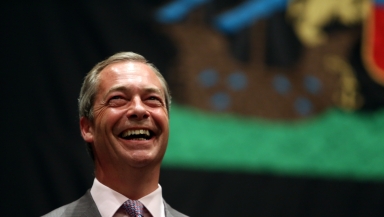
When Douglas Carswell took his seat in the House of Commons as the first elected UKIP MP, he took his seat in a silence that could be cut with a knife. The assembled members were hostile, bewildered and above all worried. Was the rise of UKIP part of a Europe-wide lurch to the right? Would there be blood in the streets? And were their majorities safe?
This silence reflects that of most Church leaders, very few of whom have taken public positions. The Roman Catholic Bishop William Kenney told The Tablet before May's European elections: "I am not at all convinced that the policies that UKIP are proposing are the best things for the poor and underprivileged" and said the EU helped to maintain peace in Europe. The Methodist Church issued a briefing note from its Countering Political Extremism Resource Group, of which more later, but apart from that the official silence is deafening.
That's not to say, of course, that individual commentators have been silent. Start a UKIP hare running on social media and the weight of opinion seems pretty firmly on one side. UKIP supporters ('kippers', as Boris Johnson calls them) are swivel-eyed racist throwbacks at best, and at worst, kissing cousins to Europe's new fascists. "UKIP/Christian? A contradiction in terms," tweeted Rosemary Stachini. "They are simply feeding prejudices and fear, and pushing the right further right," says someone else; "a party fuelled by discontent and a sense among many white British people that they have somehow lost out in life while others – immigrants, blacks, Asians, benefit claimants and others – have prospered at their expense," says another.
Is this Twitter assessment fair? There's quite a lot of evidence to support this sort of reaction. UKIP has done a deal in the European Parliament with the extreme right Polish KNP (New Right) party in order to maintain a lucrative stream of European funding. Extreme is really extreme – even France's Front National turned up its nose at them. DJ Mike Read withdrew a cod-calypso UKIP song after it was widely condemned as racist. UKIP councillor Vicky Ayling made waves after she was videoed saying that she would like to "send the lot back" – immigrants, that is. In fact, just search for 'UKIP racist' and you'll get as many examples as you want.
But, but: it isn't quite like that – or at least, it isn't all like that.
There are plenty of Christians who feel that UKIP speaks for them. Given the rapidity of the party's recent rise, all evidence is pretty much anecdotal, but anecdotally, lots of Christians – especially of an older generation whose faith is cultural as well as personal – are turning to the party because they think it embodies something the others have lost. And here's the thing: not all of them are racist, not all of them are Little Englanders and not all of them are swivel-eyed anythings.
Take, for instance, Trevor Bell, at 59 years old a semi-retired teacher living in Lancashire. He's a church leader at a church plant and heads up the work church does with Christians Against Poverty. He's pro-UKIP because he sees it as standing up for the poorest in society and believes its policy of raising the tax threshold to £13,500 will help. He also says that "by getting rid of the needless tokenistic green supplements on fuel bills, this will take some out of fuel poverty". He blames the "open door immigration policy" of various governments for keeping wages down and putting pressure on services in the most deprived neighbourhoods.
Racist? Not a bit of it. "Some say UKIP must be racist to want to control immigration, in the same way as countries like Canada or Australia do, but I believe to say that is quite ridiculous," he says; he's never encountered any racism in UKIP.
Another is Rev David Parsons, a Baptist minister and long-time UKIP supporter. His commitment is driven by a desire for justice, sparked by his reading of the prophet Amos. He says: "What has struck me in recent years is how much the social situation in Israel and Judah has echoes of much of what I see in this country today. There are gross extremes of wealth and privilege on the one hand and at the same time devastating poverty and oppression – yes, oppression – on the other.
"This has everything to do with the three political parties who are in or have recently been in power. I sense either a common hardness in them and a disregard for the poor or they are simply out of touch with what life is like for many people. In short – they need a radical shake up."
He hits back at the racism charge levelled at so many UKIP supporters. Immigration is a real issue, he says, and: "Associating racism with a policy of controlled immigration must seem like a master stroke for the other political parties. Uncontrolled immigration is an issue simply because this country doesn't have the resources to support it."
He is, of course, deeply sceptical about the EU, which he says is "as much about economics and power as community": "A better way of developing community is recognising and affirming the wealth of the diversity of traditions rather than encouraging unrestricted immigration."
Another recently-declared UKIP supporter is Alan Craig, formerly of the Christian People's Alliance and a Newham councillor. Like many other Christian supporters, he objected to gay marriage. On immigration, he says: "I have no objection to immigration in principle as it is a way whereby we can share our God-given national wealth with people from poorer countries. Nonetheless, because of my experience here, I think open-borders and mass immigration should end and there should be a moratorium on all immigration – apart of course for genuine refugees – until the capacity of our schools, doctors surgeries, hospitals and other infrastructure has caught up with the increased size of the population."
Furthermore, he says: "I don't agree with UKIP about overseas aid. We are a wealthy country and if anything we should increase aid."
Caroline Stephens is UKIP's Prospective Parliamentary Candidate for Stroud, and a Methodist. She describes a 'lightbulb' moment "realising the huge amounts of money being wasted/unaccounted for by the EU": "It was so clear an undemocratic empire had been created which required funding towards which we as British taxpayers are paying more than our fair share." Most of her fire is reserved for the EU's "interference" in British affairs, though she adds: "The divide between the rich and poor has never been more marked in living memory." She's not keen on gay marriage, either.
UKIP Christians have their own network, though it is, with respect, not a very sophisticated one. UKIP Christian Soldiers – yes, it was inspired by the hymn – was founded a few years ago by Elizabeth Biddulph, who now sends out more than 1,000 newsletters every quarter. It's not a membership organisation and is run on donations. She tells me: "I had a Christian upbringing and I found that the things UKIP said chimed with what my mother and grandmother had taught me.
"We have gay marriage now; the laws in this country throughout the centuries used to be based on Christian freedoms and on the Bible." European law, she says, "is being used against Christians", though she does not say how.
All of these people would hotly deny that they were racist, mean-spirited and resentful of change. They would recoil from any notion that UKIP was Britain's equivalent of Greece's Golden Dawn party or Poland's KNP. That is not, of course, to say that they are right, in their diagnosis either of Britain's political and economic illnesses or of their cure – just that they have a point of view, and it's honestly held by people of some intelligence and integrity.
So there is a problem with a rant like Rev Giles Fraser's earlier this month, in which he said: "I don't just disagree with UKIP. I despise them. I despise them for their smug Little Englander mentality. I despise them for their total absence of fellow-feeling towards vulnerable people who look and sound different." The problem is that he is talking accurately about some people, but not others – and probably not the majority of kippers.
Is UKIP racist? The Methodist briefing note is helpful (it was produced after an almighty row broke out over the party's use of Methodist Central Hall Westminster for its annual conference). It says that some members are clearly racist, but that the party itself is not – though "its positioning does make it an attractive mainstream home to people who hold extreme views as evidenced by the extremists who have joined". It adds that "Its policies also support an unpleasant xenophobic narrative about immigration and the 'other' that feed feelings of fear and threat."
Listening to Christian UKIP supporters, two things have become clear. First, it's absurd to excommunicate them on the grounds of the company they keep. People who disagree with them should pray that they'll be a force for good within their party. Second, and most importantly: it's the neglect by every party of the great issues of our time, like poverty and justice, as much as the comparatively trivial question of whether laws are made in Brussels or Westminster, that's driving support for UKIP.
Jesus said: "Why do you look at the speck of sawdust in your brother's eye and pay no attention to the plank in your own eye?" (Matthew 7:3). It's the parties with the power that have the responsibility to change things. It's when they won't that support shifts to those who claim that they will.










